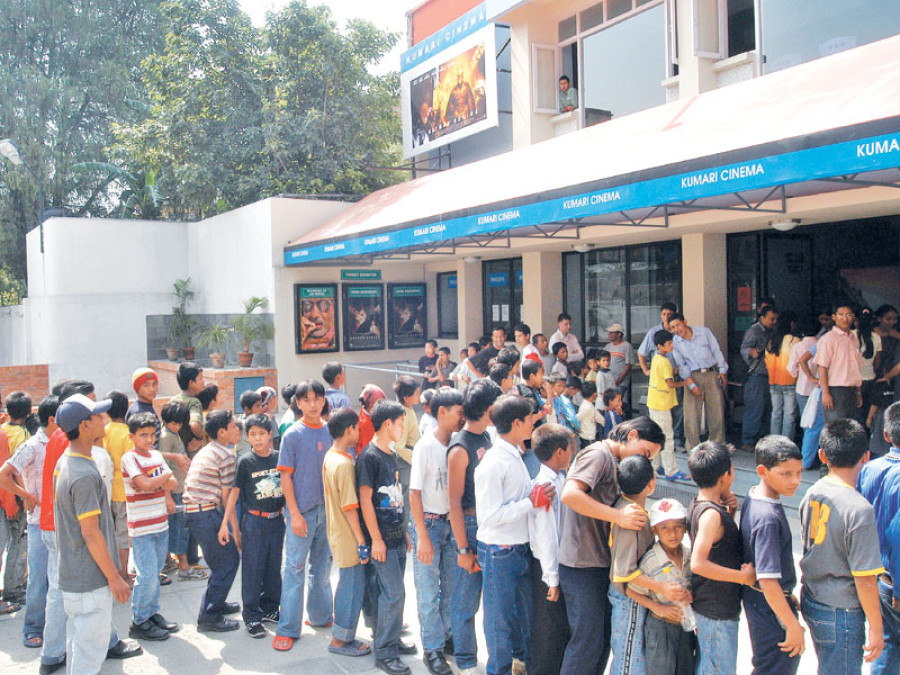Valley
Theatres turn blind eye on tax liability
Movie theatres in the Capital continue to disregard the metropolitan authority’s calls to pay up entertainment tax for screening foreign language films while the metropolis fails to punish them for defaulting.
Gaurav Thapa
Movie theatres in the Capital continue to disregard the metropolitan authority’s calls to pay up entertainment tax for screening foreign language films while the metropolis fails to punish them for defaulting.
Of the 11 cinema halls and multiplexes in Kathmandu which screen Bollywood and Hollywood movies, none have paid entertainment tax to the Kathmandu Metropolitan City, officials said. Under the Local Self-governance Act-1999, they are required to pay two percent of the total ticket sales amount for foreign language films as entertainment tax to the metropolis.
Article 141 of the Act states, “The municipality may levy entertainment tax, as prescribed, on the means of entertainment such as cinema halls, video-halls, cultural-show halls permitted within the municipal area.” The tax is not applicable for Nepali language films, but as more than three quarters of movies screened at theatres in Kathmandu are from Bollywood, taxes owed to the KMC amount to millions.
“There is no such tax,” said Sohit Manandhar, an operator of Balaju-based Asta Narayan Pictures. “We used to pay entertainment tax to Film Development Board before, but it has since been removed.”
Uddhab Poudel, proprietor of Chabahil-based Gopi Krishna Movie Hall, refused to comment on the topic altogether when contacted by the Post. “The movie theatres have not even presented details of ticket sales to us, let alone pay taxes due on them,” chief of the KMC’s Revenue Division Dhurba Kafle said. The KMC estimates that a movie theatre has a 60-seat hall on average and movies are screened two to three times a day. Counting the business for only 20 days in a month, a movie theatre sells somewhere around 3,000 tickets at varied prices. “Even by our conservative estimate we should be able to collect at least Rs2.5 million each year from all the movie theatres in the metropolis with two percent rate on entertainment tax,” Kafle said.
The 11 movie theatres in Kathmandu that screen foreign language films are QFX Kumari Cinema at Kamalpokhari; QFX Jai Nepal at Hattisar; Asta Narayan Pictures at Balaju; Ganga Hall at Balaju; Bishwajyoti Cinema Hall at Jamal; Gopi Krishna Movie Hall at Chabahil; QFX Central at Sundhara; Cine de Chef at Sundhara; Big Movies at Kamalpokhari; Q’s Cinema at Durbarmarg and FCUBE Cinemas at Chabahil. KMC has been collecting house and land tax, vehicle tax, business tax and advertisement tax regularly from the theatres but has not been able to collect entertainment tax.
Movie theatres had been paying entertainment tax to the Inland Revenue Department before the implementation of Value Added Tax in 1998. After that the mandate to collect the tax was shifted to municipalities. While municipalities outside the Valley have been duly collecting the tax, theatre operators in Kathmandu seem to have been ignoring their responsibilities. “Earlier, municipalities across the country levied local development tax on movie theatres which we duly paid. But the tax was removed some five years ago. If municipalities have introduced new taxes after that, they should inform us and collect them,” said Nakim Uddin, a stakeholder at QFX Cinemas.
The Local Self-governance Act authorises the KMC to punish tax defaulters. Article 165 empowers the municipality to stop providing services like garbage collection and even to write to the concerned body to stop transfer ownership of property of such person and to freeze their trade. Properties may even be auctioned to recover tax amount.
A metropolitan official, however, laments local bodies which have been without elected representatives for 18 years lack the will and power to punish big businesses. “The municipality often get a new chief with a change in government. In such a scenario, the chief is less motivated to clash with interest groups,” the official said, requesting anonymity.
Entertainment tax remains the least income-generating source for the KMC. According to data, it has only been able to collect Rs10,000 in entertainment tax and that too from small-scale trade fairs organised around town. “Entertainment tax is not levied on the operator’s profit but on ticket sales so the operator can add the amount on to ticket prices. Despite regular correspondence with them, they are not paying up,” Kafle said.




 22.12°C Kathmandu
22.12°C Kathmandu











